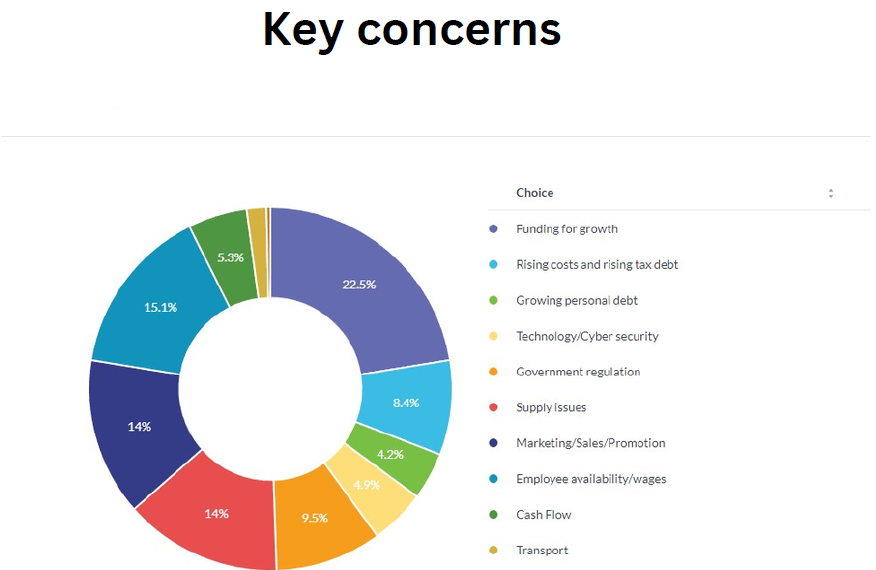Small business owners survey reveals array of challenges

Australia’s small businesses are dealing with multiple challenges including difficulties gaining access to affordable finance, labour shortages and supply problems, high costs and regulation, according to a new survey from Astute Ability Finance Group.
The August quarterly survey, the first of a series of surveys, gauged the views of small business owners across Australia with the aim of tracking the ongoing challenges and needs of the small business sector.
It included clients of Astute Ability Finance Group, a NSW Central Coast brokerage that specialises in providing asset and equipment finance for SMEs and self-employed clients.
The survey was also circulated among various SME groups on social media and shared more widely on Facebook, Instagram and LinkedIn.
The recommendations from the report include government support to provide cheaper and readily funding for business owners, targeted campaigns to assist SMEs to access employee training and online education, and making cybersecurity costs tax deductible.
Data from the Australian Small Business and Family Enterprise Ombudsman shows almost 98% of businesses in Australia are small businesses. The value of small business to the Australian economy surged by 15% in 2021-22 to $506 billion and accounts for one-third of Australia’s GDP.
The nation’s 2.5 million small businesses provide jobs for 5.1 million people and employ 42% of all apprentices and trainees – nearly double the amount supported by big businesses.
Astute Ability Finance Group is led by founder and managing director Mhairi MacLeod (pictured above), an award-winning business and equipment finance broker with more than 24 years’ experience.
MacLeod is a long-time member of the MFAA’s equipment and commercial finance forum and currently serves as the forum’s vice-president.
Key themes from the SME owners report
The survey identified a number of key priorities for small business owners:
Funding for growth
Business owners are struggling to secure affordable funds from recognised banking brands and need cheaper rates to grow, employ more and get the necessary equipment/tools of trade.
Employee availability and wages
Regional areas in particular need skilled workers in sectors such as transport, construction and trade, while restrictive pay rates in peak trading hours in restaurants and catering are proving challenging.
Supply issues
SMEs say they have difficulties securing imported business equipment, vehicles, or materials for manufacturing, exacerbated by customs clearance delays.
Marketing/sales/promotion
There’s a need for effective marketing and promotion, particularly in skill-based industries where marketing is not part of the regular business but is increasingly becoming a “must have” due to the digital influence in all sectors.
Government regulation
Survey respondents reported confusion over federal and state regulations, taxes increasing operational costs, penalty rates and general barriers in poor communication.

Source: Small Business Owners Report, August 2024, Astute Ability Finance Group
Motivation behind the survey
MacLeod said she had worked with SMEs for 27 years and there had been more talk amongst her clients recently about how the major banks in particular weren’t providing funding for small businesses.
“Also talking to my future clients – when you look at the 42% of apprentices out of the 5.1 million people that are employed by small business – these are our future clients,” MacLeod said.
“If we're having trouble getting their bosses lending and assistance through government, those apprentices aren't going to have jobs and then we're going to have a skills shortage.”
MacLeod said she was now looking after the second generation of clients – the children of clients who are now in their 20s and 30s and wanted to buy a car or equipment for their own small businesses.
Astute Ability Finance Group has been commissioning reports on future clients for over a decade – one of these reports was on Gen Zers, and now they are actual clients, many of whom had finished their apprenticeships and are self-employed tradespeople.
Personal feedback from clients about the difficulties they were facing had motivated MacLeod to set up the SME survey. She said it was important to gather this information and have the data available to show government decision-makers.
“We pulled all the data together and decided we really need to drill down and see what’s available for small business, not just scratch the surface … the feedback showed that they know there’s resources out there but they don’t know how to find it or navigate it – government resources can be very convoluted.”
MacLeod said a toolkit would be compiled to make it easier for SMEs to get access to the information they need, such as how to access free training for an apprentice, how to access cybersecurity education and where to find commercial equipment finance brokers.
The toolkit will be available to all brokers plus industry bodies representing small businesses such as the Motor Traders Association.
“When the MFAA, FBAA and CAFBA put out reports, there’s only certain people who read that. By delivering the toolkit through brokers, you show them how this can be used as a social currency with their own business, it’s going to have a much further reach – from broker to the customer.”
MacLeod is working closely with the Small Business Association of Australia, led by CEO and founder Anne Nalder, and has already presented the findings of the survey to the office of the NSW Small Business Commissioner and federal government representatives.
Access to finance
MacLeod said the small business sector was only now recovering from COVID but a lot of them couldn’t grow or upgrade equipment because their P&L statements made finance approval tricky and lending requirements were becoming too tight.
“The industry needs the support of decision makers to assist getting lending flowing and that generally means the smaller more agile lenders and fintechs.”
MacLeod was concerned that restricted access to funding could lead to fewer apprentice builders and tradies down the track.
“The major banks really tell us that they're trying to help small business, but you have to jump through hoops to get a loan.
“The second-tier lenders, fintech lenders, non-bank lenders and cash flow funders – these guys are now thriving because they're actually listening to brokers like myself and through surveys and inquiries, they're trying to meet the needs of small businesses … we’re finding a better quality lender coming through and the brokers and starting to understand and deliver to the client.”
MacLeod said the government was starting to listen to SMEs too and understand the need to support small businesses, which can be overburdened with regulation.
Marketing needs
The survey found a need for SMEs to have a strong marketing strategy, particularly online.
MacLeod said COVID had forced a lot of business activity online, encouraging people to lift their skill sets and learn how to promote their businesses in the digital space.
“How do I get my business out there and still keep it running,” said MacLeod. “Small businesses realise there’s so much more that they need to know about marketing their products … they need a lot of assistance.”
This included boosting their presence on social media and enrolling in short online courses which can help increase business owners skills in this area.
Key priorities from the survey
Feedback from survey respondents showed there are a number of priority needs for small businesses. These include:
- New equipment, vehicles, tools of trade, improved shopfront – accessing equipment and vehicles, followed by the availability of business-friendly funding
- Employee training and benefits – despite available state and federal training programs there are issues with the promotion of this training
- Developing an online presence – many non-traditional types of businesses are seeking expertise and support to create an online presence
- Increased employee numbers – this is a good sign for the economy that business owners are willing to invest in greater employee numbers
- Technology upgrades – cybersecurity, new IT and efficiency measures based on technology
Key survey recommendations
The report identified the following recommendations:
- government support to provide cheaper and more available funding for business owners preferably through smaller, more agile lending
- targeted campaigns to assist SMEs to access employee training and online education;
- reviewing how government can support regional labour needs through both resident and migrant workers
- greater marketing support for small business;
- support for female business leaders
- host a summit of industry bodies, state and federal government representatives and business owners to define government roadblocks to growth
- make cybersecurity cots tax deductible to protect businesses and their databases
What do you think of the SME survey findings? Comment below.



